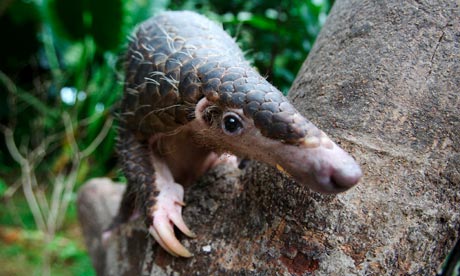 |
| Anson Wong gets physical when 101 East Presenter, Steve Chao asks him whether he continues to trade in threatened and endangered animals. — Pictures courtesy of Al Jazeera |
KUALA LUMPUR, Nov 21 — His wildlife smuggling earned him the title “Lizard King” and led wildlife groups to dub him “public enemy number one”, but the name Anson Wong drew a blank with Natural Resources and Environment Minister Datuk Seri G. Palanivel, according to an Al Jazeera reporter on the trail of the convicted smuggler’s comeback.
Steve Chao, a presenter on the “101 East” programme with the international news channel, alleged that Wong continues to operate openly in Penang and holds wildlife trading permits, despite authorities purportedly revoking Wong’s and his family’s permits in 2010, after he was convicted of smuggling endangered snakes.
“Despite being from Penang, he’s never heard of the ‘Lizard King’, which, to us, is quite shocking,” Chao told The Malay Mail Online yesterday in a phone interview, referring to Wong with his popular moniker.
He added that the minister appeared in the dark over sanctions supposedly imposed on Wong’s trade following his conviction.
“We spoke to the natural resources minister, Palanivel. In 2010, when Perhilitan (Department of Wildlife and National Parks) decided that Anson Wong should be stripped of all permits for wildlife, and companies related to wildlife, he said that the decision should be standing today. But according to the paper trail, it is not,” he added.
Far from being kept away from the trade, Chao alleged that the wildlife dealer instead kept exotic animals such rare tortoises, wild cats from North Africa, albino pythons, white and yellow snakes, deadly vipers, and chameleons in stash houses in Penang.
Steve Chao, a presenter on the “101 East” programme with the international news channel, alleged that Wong continues to operate openly in Penang and holds wildlife trading permits, despite authorities purportedly revoking Wong’s and his family’s permits in 2010, after he was convicted of smuggling endangered snakes.
“Despite being from Penang, he’s never heard of the ‘Lizard King’, which, to us, is quite shocking,” Chao told The Malay Mail Online yesterday in a phone interview, referring to Wong with his popular moniker.
He added that the minister appeared in the dark over sanctions supposedly imposed on Wong’s trade following his conviction.
“We spoke to the natural resources minister, Palanivel. In 2010, when Perhilitan (Department of Wildlife and National Parks) decided that Anson Wong should be stripped of all permits for wildlife, and companies related to wildlife, he said that the decision should be standing today. But according to the paper trail, it is not,” he added.
Far from being kept away from the trade, Chao alleged that the wildlife dealer instead kept exotic animals such rare tortoises, wild cats from North Africa, albino pythons, white and yellow snakes, deadly vipers, and chameleons in stash houses in Penang.
- See more at: themalaymailonline.com




